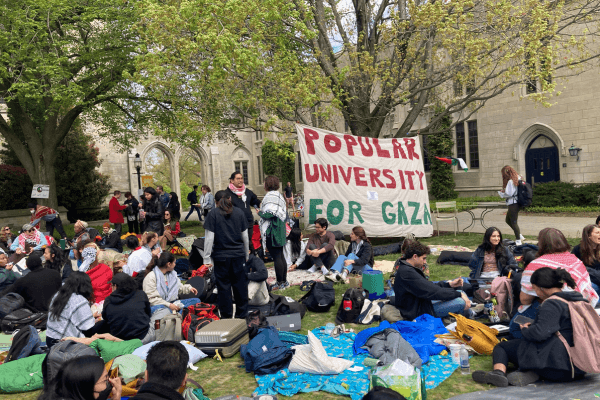Last week, just days before he addresses the nation in the State of the Union speech, President Donald Trump signed a proclamation that placed restrictions on nationals from Myanmar, Eritrea, Kyrgyzstan, Nigeria, Sudan, and Tanzania from traveling to the United States. The Department of Homeland Security said the restrictions will go into effect Feb. 21.
The move is widely seen as an expansion of ‘the Muslim ban’ that was imposed three years ago via an executive order that placed restrictions on citizens of five Muslim-majority countries: Iran, Libya, Syria, Yemen, and Somalia — as well as those from North Korea and Venezuela — from traveling to the U.S.
For people in those countries, as well as immigrants living in the U.S. from those countries, the effects are far-reaching.
“Nigeria is the most populous country in West Africa and, by extension, it is also has the largest number of Muslims in West Africa,” Vincent A. Yusuf, a journalist with Daily Trust based in Abuja, Nigeria, said.
Nigeria also has largest Christian population in Africa. The country is almost equally Muslim and Christian, with the northern half largely comprising Muslim communities and the southern half largely Christian.
And nearly 400,000 Nigerians, both Muslims and Christians, live in the U.S. Considering Nigeria is a country of 2 million people, “a lot of people will not be able to connect with their families or pursue some opportunities because of the ban,” Yusuf said.
Yusuf also said the ban could exacerbate turmoil in Sudan, where families were already being denied visas for U.S entry.
“Now with the inclusion of Sudan in the list [travel ban], the issue will only get worse,” Yusuf said.
Dr. Catherine Orsborn, director of Shoulder to Shoulder, a national interfaith coalition that works to counter anti-Muslim discrimination and violence, called the expansion “devastating” and told Sojourners, “We see the administration continue its racist and discriminatory policies through this ban.”
The current expansion restricts certain persons — decisions would apparently be based on “disqualifying information such as terrorist connections, criminal ties, or misrepresented information” — from Myanmar, Eritrea, Kyrgyzstan, and Nigeria. For those from Sudan and Tanzania, the proclamation imposes restrictions on diversity visas, that allow “diversity immigrants,” from countries with historically low rates of immigration to the United States.
Denise Bell, researcher for Refugee and Migrant Rights, Amnesty International USA, said that it seems like the administration is using ‘national security’ to mask discrimination and xenophobia.
After 2017 ban was implemented, Amnesty International released two reports about its impacts — one about the harms caused to individuals and families from Yemen, Iran, Sudan, with 12 case studies, and another about how Trump’s discriminatory policies have decimated refugee resettlement from Lebanon and Jordan, which host the highest number of refugees in the world relative to their populations.
“I interviewed 50 refugee families who were impacted by the ban and identified several who were supposed to be resettled in the U.S., but because of the ban, the resettlements did not happen as initially planned,” Bell explained, noting that one of them was resettled after 2.5 years. “The policy does nothing but discriminate against people for being who they are whether because of where they live or how they worship.”
Bell says Myanmar’s inclusion in the list is particularly alarming because the Muslim minority in the region, the Rohingya, have been heavily persecuted in recent years.
“Amnesty has done a lot of reporting from Myanmar where war crimes were committed against the Rohingya, and we are very concerned about travel bans that stop not just Muslims but all kinds of ethnic minorities from travelling abroad,” she said.
On Jan. 27, the third anniversary of the Trump administration’s original travel ban announcement, House Speaker Nancy Pelosi said in a statement that “despite the Trump administration’s hateful policies and dangerous rhetoric, this fundamental truth remains: Immigrants make America more American,” and said that the Democrats will continue to stand up against Trump’s efforts to “dishonor our proud immigrant heritage.”
On the same day, Rep. Ilhan Omar (D-Minn.) tweeted that she will continue to fight for “an America that protects the free exercise of all religions” with the hashtag #NoBanAct.
The NO BAN Act would impose limitations on the president's authority to suspend or restrict foreigners from entering the United States and would effectively end previous presidential orders that implemented such restrictions. It would also specifically prohibit religious discrimination in immigration-related decisions.
House Judiciary Committee Chairman Jerrold Nadler said on Jan. 27 the committee would take up the NO BAN Act in two weeks.
“The NO BAN Act is a very good legislative fix to this issue,” Orsborn said. She explained there’s no provision in the Immigration and Nationality Act prohibiting an administration from targeting people based on their religion.
“The NO BAN Act adds this language and fixes the loophole,” she said.
“This is an important moment for our country to show who we really are,” Orsborn said, adding that she hopes Congress “will stand up for freedom of religion and against bigotry and discrimination.”
Got something to say about what you're reading? We value your feedback!







